In recent years, efficient logistics management and the implementation of automated warehouses have radically transformed the landscape of global sales on marketplaces.
This change has not only optimized the processes of procurement, storage, and shipment of products but has also opened new frontiers in optimizing distribution chains, enabling greater speed, precision, and reliability in global commercial transactions.
Automated Logistics
Automated logistics, employing robots and autonomous systems, is radically transforming the supply and shipping chain. From autonomous robots in warehouses to automated picking solutions, operational efficiency is reaching new levels.
This not only reduces errors and accelerates delivery times but also allows for more flexible demand management.
In particular, the implementation of advanced robotics allows for faster and more precise handling of materials within warehouses, optimizing space and improving overall productivity.
Autonomous systems, with their learning capabilities, can quickly adapt to changes in demand and environmental conditions, ensuring a more resilient and responsive supply chain.
Robotized Vertical Warehouses
The adoption of robotized vertical warehouses allows for smarter use of available space.
These warehouses utilize height, allowing for greater storage capacity without increasing physical area. Autonomous robots handle picking and product placement, further improving efficiency and reducing space wastage.
The use of advanced monitoring and control technologies enables optimized inventory management, allowing companies to track the flow of goods within warehouses in real-time and forecast supply needs more accurately.
Moreover, robotized vertical warehouses also contribute to greater environmental sustainability by reducing the need to expand physical infrastructure and can be designed to optimize energy efficiency and reduce carbon emissions.
Advanced Logistics and Automated Warehouses: The Partnership between Yocabè and Asendia
Technological innovation and advanced logistics are thus defining a new era for e-commerce, an unprecedented revolution in which our new partnership with Asendia is situated.
Asendia is now a leading figure in global logistics evolution, offering innovative solutions capable of redefining the rules of the game in international shipping.
The combination of advanced logistics, automated warehouses, and a strategic vision positions Asendia as the right partner to make a difference in the complex world of global shipping.
Yocabè has seized this opportunity with a partnership that has yielded a series of benefits in developing brand performance, contributing to their success.
Partnership Benefits
#1 Guaranteed Processing Times
Warehouse automation is the key to ensuring certain and timely processing times.
The rigidity of delivery times is crucial for excelling in global marketplaces, maintaining impeccable standards in shipping times, and delivering a high-quality customer experience, thus enhancing the brand’s reputation.
#2 Competitive Shipping Costs
With an eye on internationalization, the strategic use of local couriers and a targeted approach has allowed for competitive shipping costs, regardless of the destination.
Selling localized products in Italy as if they were already in the destination country has opened up new perspectives for Yocabè brands.
This strategy not only reduced shipping costs but also expanded brand reach, offering a global customer experience.
#3 Improvement in Expected Customer Benefits
This approach has not only improved operational efficiency and reduced costs but also generated tangible benefits for customers.
The ability to offer the same advantages as local shipping, such as the absence of duties in certain destinations, has helped forge a lasting bond between brands and their customers.
Conclusions
We can therefore affirm that the combination of well-developed global logistics, the adoption of automated warehouses, and the implementation of innovative strategies has provided various brands with the opportunity to thrive and grow internationally.
Advancements in logistics and supply chain management enable companies to reach otherwise inaccessible markets and adapt to changing consumer needs more rapidly and efficiently.
Furthermore, warehouse automation not only optimized storage and handling operations but also allowed companies to focus human resources on high-value tasks such as data analysis and the development of more targeted marketing strategies, thereby contributing to consolidating their presence in the international market.



